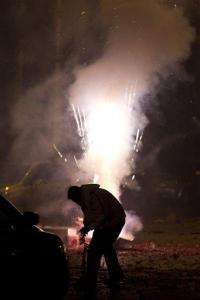In this Monday Jan. 23, 2012 file photo, a man prepares firecrackers on the Chinese Lunar New Year's Eve in Beijing, China. Clouds of smoke from Lunar New Year fireworks sent air pollution in Beijing soaring under a new more sensitive measurement system, reports said Sunday, Jan. 29. (AP Photo/Alexander F. Yuan, File)
(AP) -- Clouds of smoke from Lunar New Year fireworks sent air pollution readings soaring in the more sensitive measurement system Beijing started using a little more than a week ago, reports said Sunday.
Readings of fine particulate matter called PM2.5 reached 1.593 milligrams per cubic meter on the Jan. 22 eve of the holiday, about 100 times worse than the amount considered good for 24-hour exposure, the city's environmental bureau said.
The reading drew wide publicity in the local media on Sunday. The popular Beijing Youth Daily praised the city government for taking a more critical look at air pollution, while urging residents to consider the environmental effects of setting off fireworks.
The readings moderated under relatively clear skies in recent days. By noon Sunday, before the weeklong holiday ends and people return to work, the level stood at a relatively good 0.039.
Beijing is frequently cloaked in yellow haze that obscures buildings a couple of blocks away. On particularly bad days, schools cancel outdoor activities and hospitals treat more people - particularly the elderly - for respiratory complaints.
The city began measuring the small particles in the air and releasing the readings on Jan. 21, as concern has grown over Beijing's air pollution from all sources. PM2.5 - particles less than 2.5 micrometers in size, or about 1/30th the width of an average human hair - are believed to be the greatest health risk because their smallness means they can lodge deeply in the lungs.
Beijing previously had only given PM10 measurements of coarser particles, which indicated pollution was "light," leading to accusations the true extent of the problem was hidden.
The U.S. Embassy since last year has released PM2.5 readings from a device on its rooftop and some residents have tested the air in their neighborhoods and posted the results online.
The embassy measured more pollution than the city on Sunday, but the sampling stations are 10 miles apart or more.
Beijing says its PM2.5 measuring station is about 4 miles (7 kilometers) west of central Tiananmen Square.
©2012 The Associated Press. All rights reserved. This material may not be published, broadcast, rewritten or redistributed.
























